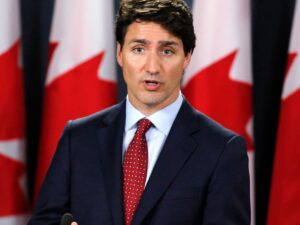Separation preserves Canada, doesn’t break it up: Wexit
The Wexit Canada separatist movement isn’t breaking up Canada but rather preserving Canada, says Wexit member Ambrose Ralph who hosts Alberta to the Point podcast.
Speaking from his home in Grande Prairie Aug. 30, Ralph, a former combat engineer in the 1 Canadian Mechanized Brigade based in Edmonton, said western Canadians need to look at western sovereignty from a different angle.
“Perhaps we are not leaving Canada,” he said. “Perhaps we are preserving Canada in the west for our future generations so our children and our grandchildren can have the same opportunities we had.”
“We are not leaving Canada… we are preserving Canada.” – Wexit Click To Tweet
Ralph said Canadian values are diminishing in the east and not the west.
“The Canada that we once loved and cherished is dying. The Canada that I was willing to give my life for, those values that made Canada great, the ones that made Canada the best country in the world, are strong and alive and well in the west. Family values, work ethic, honesty, helping your neighbour, truth, duty, loyalty and honour, they are all strong here in the west.”
Ralph maintained the current Liberal government is destroying not just the west but also the entire country.
“Don’t put ourselves in a position where our children and our grandchildren ask us why taxes are so high, why Canada has a multi-trillion dollar debt. I just hope we don’t say ‘yeah we were once prosperous and had a decent life and the government stole it from us.’ What did you do they will ask us. ‘Nothing. We did nothing. We just sat back and watched it all happen. Sorry.’”
Vote splitting a myth
Ralph said vote splitting is “an eastern lie spread by mainstream media, the Conservative Party of Canada and the Jason Kenney’s of the world.”
Canada Wexit Leader Jay Hill, who was a Conservative Member of Parliament for 17 years, agreed saying fear of vote splitting is the message the Conservative Party uses to frighten western voters to vote for them.
“There are 49 constituencies in the west where the Conservatives were elected by wide margins. Even if the vote split equally between (Conservatives) and Wexit, it would be highly unlikely for a Liberal, an NDP, or a Green candidate to win in those ridings.”
Hill said voters in those 49 ridings have a clear choice of either sending a Conservative or a Wexit MP to Ottawa as their representative.
“Conservative MP’s will face strict party discipline to vote whichever way provides their leader and their party the best opportunity for support in central and eastern Canada,” he said.
“A Wexit Canada MP, on the other hand, will always vote in the best interest of their constituency and the west.”
Hill said during the Reform Party years under then federal Opposition Leader Preston Manning, the west had almost two decades of prosperity.
Ralph said in the last two elections the west voted Conservative and Trudeau still became prime minister.
“Wexit will give us our own voice and own representation from the west,” said Ralph. “If the Conservatives win a minority and Wexit wins the west we would hold the balance of power in Parliament. That is scary for the east.”
Ralph said voters need to try something different in politics.
“Do you want the west to have a voice or listen to the lies about vote splitting? Are you going to vote Conservative to help eastern Conservatives or are you Alberta first? Saskatchewan first? Manitoba first? B.C. first? We need to look after ourselves first.
“If Trudeau wins, as recent polls indicate, he will be getting another mandate from eastern Canada to continue to destroy our resource-based economy. A mandate to attack our farmers, our ranchers, our loggers, our oil and gas workers.”
Ralph said people should vote strategically.
“We must vote for us, for our children, for our grandchildren, and not be concerned how the east votes. We must unite in the west and vote for Wexit Canada.”
Conservative Party not the answer
Ralph said Erin O’Toole, the federal Conservative Party’s new leader, can’t help the west.
“If he cancels equalization he will lose votes in Quebec and the Maritimes. If he cancels the carbon tax he will lose votes in vote-rich area of Toronto. If he ends foreign oil and puts the pipeline through he will lose votes in Quebec and end any possibility of Erin O’Toole being prime minister of Canada.
“To be in the prime minister’s office you have to pander your votes to the vote-rich regions of Toronto and Quebec. If you don’t it’s impossible to win that office.”
Ralph said once O’Toole’s team breaks down the seat count in Canada, looks at the map, looks at the ridings and looks at the path to become prime minister, it would be clear.
“The path will become clear the road travels through Toronto and the road travels through Quebec and not the west. To win he has to pander to the vote-rich regions of the golden triangle, Toronto, Quebec and Ottawa.”
Wexit Canada
Western alienation grew after Prime Minister Justin Trudeau took office in 2015 and grew when he won the 2019 federal election.
Wexit was co-founded by Peter Downing, a former soldier and RCMP officer who was accused of being a “far right conspiracy theorist.”
Downing went on leave from the RCMP for almost two years after serving a probationary period for uttering threats against his now ex-wife. He then joined the military.
Wexit Canada is preparing to have candidates run in case an election is called this fall.
Downing stepped down as party leader in June, making way for Hill, a former MP for the riding of Prince George – Peace River from 1993 until 2010 when he retired.
Hill was Government House Leader and he was Secretary of State in the Harper government.
Premier Kenney rejects Wexit
After being elected in 2019, Premier Jason Kenney created a panel to find a “fair deal” for Alberta and examine more independence for the province.
He said he acknowledged that some western Canadians don’t feel at home in their own country, and said “Laurentian elites have both benefited from Alberta’s wealth and abandoned Alberta in its time of need.”
Kenney, however, rejects the idea of separation calling it “irrational.”




